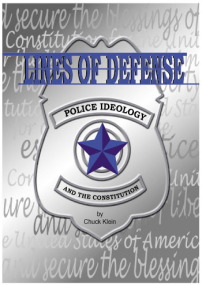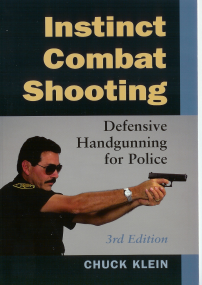THE FALLACY OF "REASONABLE" GUN CONTROL LAWS
Chuck Klein © 2003
This article appeared in the April 2003 issue of Guns & Ammo Magazine.
The Second Amendment clause, "The right of the people," indicates that the framers were acknowledging a right rather than granting a right. Therefore, this right "to keep and bear arms" (RKBA) is an inherent and intrinsic right that predates the Constitution. A preexisting right cannot ever be malum prohibitum - wrong because legislatures, courts or political correctness says it's wrong.
Regardless of this legal fact, our detractors will be gearing up to challenge the Emerson decision which confirmed that the Second Amendment is not only a right, but an individual right and not a collective right. The anti-gunners might have to finally admit to this, but they will not roll over or curtail their attacks on us. Their next assault might be to the effect that, though the RKBA is an individual right, it is not absolute. They will contend that even a mandate is not absolute and thus is subject to restrictions..jpg)
Contrary to what some over zealous pro-gunners want to believe, the antis are correct inasmuch as the RKBA is not an absolute. If it was, we would have to allow little children and prison inmates to keep and bear arms. Therefore, some limits must be acceptable. But limits do not mean anything the legislature/courts want it to be. Bearing arms is not an absolute right under all conditions anymore than free speech allows one to yell fire in a crowded building when there is no fire. The constitutional right to bear arms does have limits, but these confines are only limited to two factors: Citizenship and Other's Rights.
"The greatest dangers to liberty lurk in insidious encroachment by men of zeal, well-meaning but without understanding." Justice Louis Brandeis, 1927."
|
CITIZENSHIP:
At the time of the Constitution's inception the framers, all "men" in a "man's world," clearly gave little thought to anyone other than the man as the defender of family, property or country. Whereas in Eighteenth-Century England, only the landed rich, were empowered to defend honor and country. This concept of all men being full "citizens" and having the right, empowerment and obligation to self preservation was unique to America.
A citizen, circa 1785, was considered to be any white, American, male over the age of 21 and not a felon. The idea of civilian gun controls was unconscionable. It is was also inconceivable that a Thomas Jefferson or a James Madison would refuse to take a musket away from a drunk, a child or someone conspicuously deranged. Had one been able to ask these learned, most-sacred-document framers of the conflict of such a restrictive action; they most likely would have replied with words to the effect that the drunk or mental incompetent were, at least temporarily, not citizens. A child was, of course, not a man and a felon had forsaken his citizenship.
With the ratification of the 13th, 14th and 19th Amendments all of-age Americans were recognized as full, ruling-class citizens. Arms possession was, AND STILL IS, the signature of being a citizen - not a subject to some monarchy and most assuredly not mentally inept, a child, a felon, or a substance abuser.
OTHER'S RIGHTS:
Violating the rights of others is cause to restrict gun rights. Allowing certain persons, such as children, felons, drunks, etc., to possess firearms most assuredly creates a substantial risk of loss of someone's life or liberty - just as permitting suburbanites to mass weapons of mass destruction such as bombs and missiles. However, restricting the RIGHT of a law- abiding, bona fide citizen from carrying a firearm that is concealed from public view where it can not induce panic or be available to a snatch-and-grab thief, does not present a substantial risk of damage to anyone. Likewise, machine guns, assault rifles, or short-barreled shotguns, while in the possession of law-abiding citizens, are of no danger to others.
Small LOD:  Constitutional rights are only such when they don't infringe on the constitutional rights of others. One's right to swing his fist ends where the other person's nose begins. Of course, if one keeps his fist concealed in his pocket he is violating no ones rights. On the same token, if a law-abiding citizen goes about his legal business with a firearm concealed in his pocket he is no more infringing the rights of any other person than the theater-goer who keeps the word "fire" concealed in his mouth.
Constitutional rights are only such when they don't infringe on the constitutional rights of others. One's right to swing his fist ends where the other person's nose begins. Of course, if one keeps his fist concealed in his pocket he is violating no ones rights. On the same token, if a law-abiding citizen goes about his legal business with a firearm concealed in his pocket he is no more infringing the rights of any other person than the theater-goer who keeps the word "fire" concealed in his mouth.
Some citizens might wish to exercise their right to the "pursuit of happiness" by not wanting to be in the presence of guns. On their own property, not accessible to the public, they can do as they please. However, where public property is involved such as court houses, police stations and legislatures guns can be restricted by instituting the use of metal detectors and storage boxes that the carrier can store his/her gun until he/she leaves that secure area.
But what about the reasonableness factor? Other "rights" such as those found in the Third, Fourth and Eight Amendments are subject to this doctrine of reasonableness - why not the Second? Our enemies might argue that, under the reasonableness doctrine, it is reasonable to ban certain types of arms or exclude bearing of arms into specified locations without incorporating metal detectors/lock boxes.
____________________________________________________________________________________________________________________________________
Unlike other Articles and Amendments there is no such provision for "reasonableness" in the Second Amendment. Discretion is not part of the right to bear arms. In other portions of our Constitution we see the following discretionary wording:
Article I, Section 4: "Each house may determine the rules...."
Amendment III: "...but in a manner prescribed by law."
Amendment IV: "...against unreasonable searches...upon probable cause."
Amendment VIII: "Excessive bail....nor excessive fines...nor unusual punishments"
If the framers of the Constitution had intended for the bearing of arms to be anything other than what it says, they would have included in the Second Amendment subjective words or terms such as "reasonable," "excessive," "prescribed by law," "upon probable cause," "unusual," or "may".
____________________________________________________________________________________________________________________________________
Reading discretionary or reasonableness provisions into the Second Amendment of our Bill of Rights is no different than reading the First Amendment to say: "Congress shall make no UNREASONABLE law respecting an establishment of religion..." If the legislature or the courts are permitted to insert reasonableness into the Second Amendment, what's to prevent them from saying a national church or attending church only on Tuesdays is not unreasonable. Not in America, not yet anyway!
SUMMARY:
 The Second Amendment's right to bear arms is not an absolute - but restrictive conveyances can only be based on citizenship and the rule of other's rights. In other words, if you are not precluded from owning a gun and your exercising of this right does not infringe on anyone else's right, you can bear any type of arm anywhere you wish.
The Second Amendment's right to bear arms is not an absolute - but restrictive conveyances can only be based on citizenship and the rule of other's rights. In other words, if you are not precluded from owning a gun and your exercising of this right does not infringe on anyone else's right, you can bear any type of arm anywhere you wish.